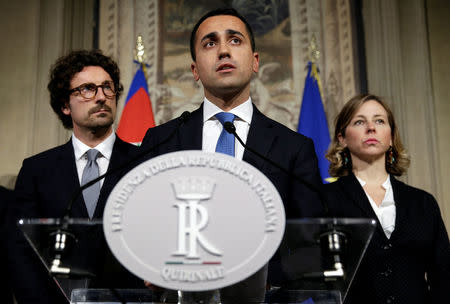Italy's 5-Star, League on verge of government deal; markets shudder
By Gavin Jones and Steve Scherer
ROME (Reuters) - Italy's two anti-system parties on Wednesday appeared on the verge of clinching a deal to form a coalition government after 10 weeks of stalemate, rattling markets with radical ideas to free up billions of euros for tax cuts and welfare.
The far-right League and the 5-Star Movement have been discussing a common policy agenda for a week after a March 4 election ended in a hung parliament.
"It would be crazy to give up at the moment of truth," League leader Matteo Salvini said in a live video stream on Facebook, adding that he would not be intimidated by negative reaction from financial markets or attacks from the media.
"The more they insult us, the more they threaten us, the more they blackmail us, the more desire I have to embark on this challenge," he said.
Officials from the two parties said they had completed work on drafting a joint policy programme, leaving it to Salvini and 5-Star leader Luigi Di Maio to sign off on the document.
"It's a good programme, but there are still one or two areas of difference for the leaders to decide on," the League's economics chief Claudio Borghi told Reuters.
There was still no word on the thorny issue of who would be prime minister. Neither Salvini nor Di Maio want the other to get the job, but they have yet to find a mutually acceptable alternative figure.
Late on Tuesday, a draft coalition programme leaked. In it, the parties said they planned to ask the European Central Bank to forgive 250 billion euros ($296 billion) of Italian debt purchased under the euro zone central bank's quantitative easing (QE) programme.
Italy's borrowing costs jumped and its stocks slid on the news even after Borghi said the request for debt forgiveness was not in an official draft of their programme.
He said the leaked version was "only some notes", while what the parties want is for the European Union not to account for bonds bought by the ECB under QE when calculating a country's official debt levels for the purposes of the EU Stability Pact.
Italy's 10-year bond yield jumped nearly 19 basis points to 2.13 percent, its highest level since early March and the biggest one-day rise since March 2017, while Italian bluechip stocks fell 2.5 percent.
PAYING FOR PROMISES
The ideas in the draft programme underscore the great difficulties in finding the resources needed to pay for promises the two rival parties made to their voters during the campaign.
The League has pledged to introduce a flat tax rate of 15 percent, which would lower tax revenues by some 80 billion euros ($95 billion) per year, according to some estimates, while 5-Star has pledged new welfare payments for the poor costed at 17 billion euros.
They have both vowed to scrap an unpopular pension reform -- a move that would punch a 15-billion-euro hole in state coffers.
Italy already has an enormous debt worth more than 130 percent of annual output, second only to Greece in the EU. The bloc's budget rules require it to cut the debt pile aggressively under the "fiscal compact", which both parties want scrapped.
Salvini dismissed concerns about the widening gap, or spread, between Italy's benchmark bonds and safer German ones as a sign the two potential partners were on the right track. The spread is a "cynical board game of high finance," he said.
Di Maio told reporters in parliament "the recipe to lower public debt is by investments and expansionary policies".
EU leaders meeting in Sofia on Wednesday are likely to be concerned by the rhetoric of the parties which could form a new Italian government as early as next week.
In Brussels, European Commission President Jean-Claude Juncker said the EU would not be complete without Italy, when asked at a news conference about Italy's role in the EU and its reliability in respecting common rules.
"Italy is of the highest importance for the European Union. The European Union would not be complete without the Italian nation," Juncker said. He declined to comment on the outcome of the coalition talks.
President Sergio Mattarella, who has repeatedly stressed the importance of maintaining a strong, pro-European stance, may also be dismayed.
Both groups have a history of euroscepticism. 5-Star has moderated its position considerably in the last year, rowing back on a previous plan to hold a referendum on Italy's membership of the currency bloc. However, the League still wants to leave the euro zone as soon as politically feasible.
They also share an anti-establishment sentiment that has taken root in Italy but which has international parallels such as Britain's vote to leave the EU and the U.S. election of President Donald Trump.
Each party plans to consult its supporters over the weekend to see if they back the nascent government pact. The policy programme will probably be published on Thursday, 5-Star said.
(Additional reporting by Balazs Koranyi in Frankfurt, Francesco Guarascio in Brussels, Editing by William Maclean and Crispian Balmer)



